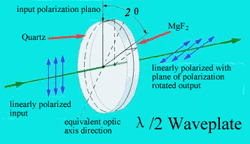|
Achromatic waveplate is similar to Zero-order waveplate except that the two plates are made from different materials, such as crystal quartz and magnesium fluoride. Since the dispersion of the birefringence can be different for the two materials, it is possible to specify the retardation values at a wavelength range. Hence, the retardation of the resulting waveplate can be made to low sensitivity to wavelength change.
|
|
Based on the contact methods of two plates, we classify the achromatic waveplate to two types: Airspacedand Cemented.
|
|
Advantages:
1) Superior broadband performance >300 nm
2) Retardation maintained to λ/100 over the Bandwidth
3) AR coated
4) Optical bonding, airspaced, cemented
5) High damaged threshold
6) λ, λ/2, λ/4, λ/8…
7) Low price
|
|
Specification:
1) Substrate Material: crystal Quartz and MgF2
2) Dimension Tolerance: +0.0, -0.2mm
3) Wavefront Distortion: λ/4 @ 633nm
4) Retardation Tolerance: up to λ/100 at specified wavelength
5) Wavelength Range: see the attached table
6) Parallelism: up to 10 arc second
7) Surface Quality: 20/10 scratch and dig
|
  |
|
Application:
1) Telecommunication: S+C+L band (1450nm~1650nm)
2) Laser (pulsing laser, tunable laser, LD laser, OPOs, etc)
3) Optical instrument (spectrophotometry, spectral analysis, achromatic telescope, etc.)
|
|
Standard Wavelength:
VIS: 465nm~610nm
NIR: 700nm~1000nm
IR: 1200nm~1650nm
|
|
|
|